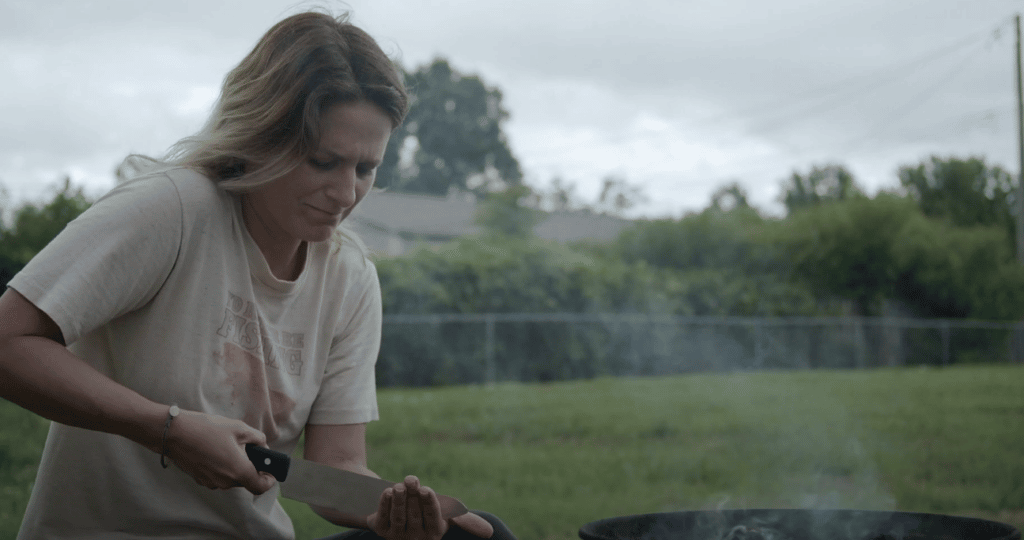
Dementer sets out everything it’s going to do in its first few minutes – and, to its detriment, it doesn’t move forward from there. Firstly, we get the horror archetypes – the backwoods setting, the naked girl running through crop fields to a discordant soundtrack, the intimations of something occult – and then, bam, we’re given something not just realistic, but in some respects real, with a cast of largely non-actors, at least a few of whom are unlikely to have realised that they’re in a film at all. This feels like an odd lurch from one thing to another, and unfortunately, this weak link between supernatural/psychological and real overshadows the rest of the film, never being united by a narrative nor leading to any sort of tangible finale.
After the trippy intro, we are introduced to Katie (Katie Groshong), just at the point she gets a new job as a care assistant at a home for adults with mental disabilities. She seems to settle well, but it seems there’s more to Katie. To piece it together, she seems to be rootless, detached from her friends and family whilst occasionally spending time with an odd clan, and she’s undergoing unsettling hallucinations which impinge on the day to day. As she explains to the other care staff, she isn’t much of a sleeper, anyway. Using a notebook – one of her only possessions – she begins going over and over instructions for some sort of ritual. These preparations involve one of the residents, a woman with Down’s Syndrome called Stephanie (Stephanie Kinkle, director Chad Crawford Kinkle’s sister). Stephanie starts to get ill around the same time, but is that as a result of the ritual, or is the ritual intended to be protective?
To be clear, I was a huge fan of Jug Face, the debut feature by the same director, and continue to regard it really highly: I said back in 2013 that I was excited by what it promised for the future, and given its sense of style, its execution and its great cast (Larry Fessenden returns in Dementer for a brief appearance), it more than holds up. Of course, getting independent films made is tough going, which may well be why it’s been some time between that film and this; also, by no means are filmmakers expected to take the same trajectory in later works – even though there is some slight overlap between Jug Face and Dementer, as seen in the presence of an unknown occult force which impacts upon the unsuspecting. Okay. But, sadly, there’s little sense of the finesse of the earlier film here, even given that its abstract nature is deliberate. It’s very unpolished, with lots of unscripted conversation which ebbs and lulls, but then gets drowned out with the ‘surreal’ elements: footage of shorthand-for-creepy objects such as dolls, candles and bones, a relentlessly twanging soundtrack and a voiceover intoning about blood and devils. It’s by no means an issue solely in Dementer, but there needs to be a moratorium on thinking that a few shots of antlers etc. by night give us all the atmosphere we could ever hope for. Creepy objects are okay when they’re grounded in a narrative; I simply don’t think they do the job alone. Likewise, insinuations of animal cruelty are unwelcome. It’s a funny thing, but many of the issues which I had with Sator, made in the same year as Dementer, match up, albeit that Sator is as painfully quiet as Dementer is occasionally loud. Some audiences clearly can and do forgive much in the pursuit of atmospherics and mood; others need more explication, a sense of a direction of travel. A fractured mind alone is not enough for me.
It pains me to have had this experience as, in several respects, Crawford Kinkle has made some brave decisions in his inclusions here. It is still beyond rare to see the world which is inhabited by people with profound learning difficulties, as if you don’t work in that world or visit people who live in it, you’ll barely be aware of it. It’s reality, but an almost parallel reality, not one which most people would recognise. Rarer still is it to centre your film on a person with Down’s Syndrome and do so sensitively; Stephanie Kinkle is obviously quite profoundly affected by her condition, something which no doubt created special considerations, but at no point is anything here tokenistic. That is commendable, as much as it’s unusual. I believe that Chad Crawford Kinkle is a talented filmmaker who took a swing at some unexpected stylistic decisions and inclusions here; it’s clear to see that, but Dementer simply lacks too much explication and development to really work as a cohesive, gripping film.
Dementer (2019) released to VOD on 2nd March 2021.
